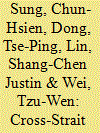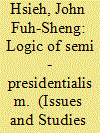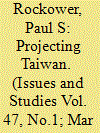|
|
|
Sort Order |
|
|
|
Items / Page
|
|
|
|
|
|
|
| Srl | Item |
| 1 |
ID:
107323


|
|
|
|
|
| Publication |
2011.
|
| Summary/Abstract |
In recent years, a system of "province leading counties" (shengguanxian) is rising in most Chinese provinces. The main features of this administrative reform, which took place during the period 2002-2008, were the expansion of counties' administrative and economic powers and the implementation of a "province leading counties" fiscal system. The depth of this reform, in terms of the number of powers devolved to counties and the type of local fiscal system, varied widely between provinces. This article explores the experiences of the provinces of Zhejiang. Jiangsu, and Jilin and seeks to explain why and how the "province leading counties" policy has become increasingly popular. The article suggests that even though the stated aim of the reform is to promote the economic development of counties, the significant local variation in its implementation is the result of provincial political-economic factors, that is to say, interaction between the provincial leadership, private business, and the varying capabilities of prefecture-level cities and counties. This contrasts with the view of some scholars that variations in the intensity of the reform can be attributed to differing levels of marketization and economic development among provinces.
|
|
|
|
|
|
|
|
|
|
|
|
|
|
|
|
| 2 |
ID:
107321


|
|
|
|
|
| Publication |
2011.
|
| Summary/Abstract |
The third round of talks between Chiang Pin-kung (???) chairman of Taiwan's Straits Exchange Foundation, and Chen Yunlin (???), president of China's Association for Relations Across the Taiwan Strait, established an institutionalized platform for legal cooperation by concluding the Agreement on Joint Cross-Strait Crime-fighting and Mutual Judicial Assistance (hereafter, the Cross-Strait Judicial Agreement). This study will focus on Article 10 of the Cross-Strait Judicial Agreement, which contains the only reference in international law to Taiwan's and China's responsibility to recognize arbitration awards. This article will examine international rules for recognizing judgments and will make reference to other similar agreements in China that provide models for a future agreement with Taiwan. It is concluded that the form of Article 10 of the Cross-Strait Judicial Agreement can only be regarded as a first step toward judicial cooperation. A further and detailed bilateral agreement would provide safeguards for this preferential treatment. The need to avoid controversy cannot be used as an excuse for ignoring certain important matters.
|
|
|
|
|
|
|
|
|
|
|
|
|
|
|
|
| 3 |
ID:
107319


|
|
|
|
|
| Publication |
2011.
|
| Summary/Abstract |
Unrecognized claimants to statehood (UCSs), as referred to in this article, are political communities that meet many of the criteria of a state according to international law, but whose claims to statehood do not receive unequivocal recognition by existing states generally or collective recognition by the international community as a whole through admission to the United Notions as a member-state. Since the end of World War II, a considerable number of UCSs have emerged under varied circumstances, such as protracted conflict within a state, secession, or as a result of a collective policy of non-recognition by the international community. This article suggests that although the lack of general recognition does affect the international legal position of a UCS and the exercise of its rights and duties, it does not render such an entity legally nonexistent. Generally speaking, where the existence of a UCS does not involve a violation of international law, other states have acknowledged the separate international legal capacity of that entity and conducted extensive dealings with it. By contrast, where a UCS is created by acts violating international law, a collective policy of non-recognition can become alarm of sanction that leads to greater limitations on the dealings of the entity concerned with the inter-national community, to the extent that its separate identity under international law may become doubtful. A comparative analysis of Taiwan and the Turkish Republic of Northern Cyprus reflects a considerable degree of consistency in state practice as regards how the positions of UCSs are tackled under international law.
|
|
|
|
|
|
|
|
|
|
|
|
|
|
|
|
| 4 |
ID:
107320


|
|
|
|
|
| Publication |
2011.
|
| Summary/Abstract |
Semi-presidentialism is a vague term which may refer to several different forms of government. This paper explores only one special type of semi-presidentialism, and shows that, even under similar institutional arrangements, actual practices may differ greatly. The two cases, France and Taiwan, share the basic features of such a system, though the French president has more powers than his counterpart in Taiwan. But interestingly, when the presidents party/coalition has been in the minority in parliament, the French president has frequently chosen to compromise and to cohabit ate with a prime minister supported by the parliamentary majority, while his counterpart in Taiwan has decided to confront the parliament by forming a minority government. As argued in the paper this can be accounted for by strategic behavior on the part of the president and the parliamentary majority in manipulating the loophole created by such a system. History and the nature of social cleavages have something to do with it as well.
|
|
|
|
|
|
|
|
|
|
|
|
|
|
|
|
| 5 |
ID:
107322


|
|
|
|
|
| Publication |
2011.
|
| Summary/Abstract |
Because of its diplomatic isolation, Taiwan has used, and continues to rise, public diplomacy as a vital medium for presenting its values and utility in the international community while bypassing issues of recognition. This article examines Taiwan's public diplomacy and soft power projection. It analyzes Taiwan's public diplomacy outreach and evaluates its public diplomacy strategies and tactics by focusing on Taiwan's ability to present its utility relevance, and values to the international community. It assesses Taiwan's public diplomacy institutions and tools, and the instruments employed to implement public diplomacy outreach. Further, more, it examines Taiwanese soft power and the elements that enhance its "power of influence." The author categorizes Taiwan as a "middle power" and compares its public diplomacy efforts to those of similar middle power slates, especially in relation to the public diplomacy strategy of niche diplomacy.
|
|
|
|
|
|
|
|
|
|
|
|
|
|
|
|
|
|
|
|
|